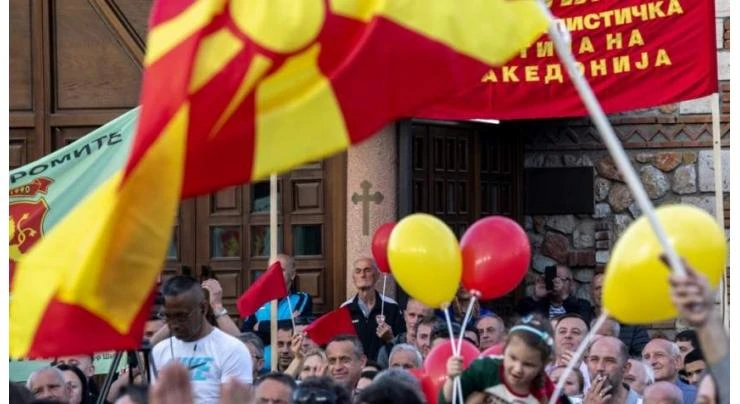N. Macedonia polls set to upend ties with EU neighbours

Stay tuned with 24 News HD Android App

North Macedonia appears to be on a collision course with its EU neighbours Greece and Bulgaria, with double-header elections Wednesday likely to return the country's right-wing opposition to power.
The vote could have a major effect on the Balkan country's dream of joining the European Union.
After scoring a landslide win in the first round of presidential elections last month, the nationalist VMRO-DPMNE party was heading into the run-off vote and simultaneous parliamentary elections brimming with confidence.
Party chief Hristijan Mickoski has refused to acknowledge the country's new name and a historic agreement with Greece in 2018, which added "North" to its title to settle a long-running dispute and allowed the country to join NATO.
Mickoski has also vowed to stand firm in a tussle with Bulgaria over linguistic and historical issues that has seen Sofia block North Macedonia's EU accession talks for the past two years.
Bulgaria has demanded Skopje change its constitution to acknowledge its Bulgarian minority.
Polls closed at 7:00 pm local time (1700 GMT) on Wednesday.
Mass emigration
"Victory is within reach and it is a consequence of all the suffering and humiliation this government brought," Mickoski told supporters ahead of the vote at a rally in the capital fired up by his nationalist message.
If his VMRO-DPMNE party secures a majority in the parliament, Mickoski will likely be the country's next prime minister.
Since taking over the right-wing VMRO-DPMNE in 2017, Mickoski has revamped the tattered party after its former leader and ex-PM Nikola Gruevski fled corruption convictions and was given asylum in Viktor Orban's Hungary.
Mickoski has also pledged to create tens of thousands of jobs, a message that has found a welcome audience with many in the country battered by abysmal economic growth and soaring inflation.
North Macedonia has lost some 10 percent of its population to mass emigration over the past two decades, with few opportunities for the young.
"VMRO-DPMNE has a great advantage and has the possibility of getting an even wider mobilisation of voters," said political analyst Xhelal Neziri.
Albanian minority
In the run-up to Wednesday's contest, Mickoski has used increasingly aggressive language toward the country's largest Albanian party -- the DUI -- stirring anxieties that the rhetoric could undercut fragile inter-ethnic relations.
Albanians make up more than a quarter of the country's population of 1.8 million, with the DUI's leader Ali Ahmeti leading a brief armed revolt for greater rights for Albanians in 2001.
Since declaring independence from Yugoslavia in 1991, successive governments have followed an unwritten rule that an ethnic Albanian party must be included in the governing coalition.
The DUI, along with an alliance of minority parties, appears set to capture the largest number of Albanian votes despite Mickoski lambasting its leaders over alleged corruption.
"Whenever I tell the truth, they distort it as an attack against Albanians," said Mickoski.
The comments have rattled many ahead of Wednesday's vote.
"Albanians and Macedonians shouldn't elect unfit leaders... the people always expect something better," said Hasan Rashiti, a 60-year-old ethnic Albanian voter living in Skopje.
The ruling centre-left Social Democrats (SDSM) have warned that the elections will decide whether Macedonia has a future in the EU, but they have struggled to regain the initiative since their first-round loss in the presidential poll.
"The citizens will have the final decision in which direction the state will be moving," said former prime minister and SDSM chief Dimitar Kovacevski after casting his vote.
The SDSM are pinning their political hopes on unlocking talks with the EU and appeasing Bulgaria.
They tried to amend the constitution to acknowledge the Bulgarian minority but lacked the numbers to win a parliamentary vote.
Despite the roadblocks to EU membership, many voters remained hopeful that North Macedonia would join the bloc in the future.
"Without the European community we can not survive," Trajce Nacevski, a 90-year-old pensioner, told AFP. "We are a small country."
